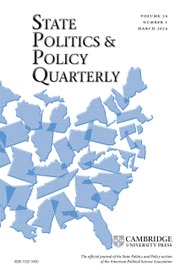Article contents
Politics, Race, and American State Electoral Reforms after Election 2000
Published online by Cambridge University Press: 25 January 2021
Abstract
The controversial presidential election of 2000 triggered a wide variety of electoral reforms in many states. We examine the impact of a state's politics, ethnicity, and fiscal health on the passage of these reforms. Using state-level data from 2001 and 2002, we find that the partisan make-up of state government frequently influenced the fate of these reforms. States with a divided government or high party competition tended not to adopt several key electoral reforms, while partisanship and the interaction of partisanship and minority representation influenced the adoption of others. Fiscal constraints and institutional arrangements had less impact on reform adoption. Overall, our findings suggest that electoral reforms were shaped more by political factors than by fiscal concerns or any objective need for reform.
- Type
- Research Article
- Information
- Copyright
- Copyright © 2006 by the Board of Trustees of the University of Illinois
References
- 7
- Cited by


